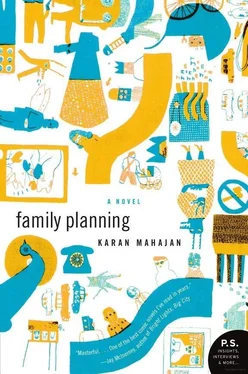The flyovers were passé. It was the Delhi Metro — appearing overnight as a series of giant digs through Delhi’s spinal tract, mounds of earth shoveled handsomely and packed onto unused sidewalks — that people now pined for.
The Flyover Yaars were all image and little singing.
So, in a sense, things had been going well for Arjun when the disaster happened.
This was the start of the disaster: in September, Mrs. Ahuja went into labor and was rushed to the hospital and Arjun didn’t even know. Mrs. Ahuja gave birth to a healthy baby girl, the fourteenth and (for a while) the last of the Ahujas and the whole time Arjun was unreachable on his cell phone — why? Because he was doing an important political favor for his father, which involved buying seventy boxes of sweetmeats for supporters and not answering calls from random numbers. He came home and was surprised to find only servants and five of his siblings, each of whom told him the same thing: Where were you, bhaiya?
He had never missed any of Mama’s frequent births, and he hadn’t intended to miss this one. But even this oversight could have been excused. A birth lasts a few hours; what counts is the aftermath. Except when Arjun saw Mama lying on a stretcher in the hospital, he didn’t know what to say to her. He saw her and kissed her on the cheek and cooed politely with the curled-up puckered little baby girl that was trying her hardest to blink in the white lights of the hospital but felt, among his siblings and before his mother, like a courteous stranger. A stranger so courteous and so distant that even that initial scalding temptation to tell his siblings Why are you smirking, I have work to do, you’re worse than stepchildren, Papa didn’t even want to marry Mama, she just showed upon the wedding day , and to enter then into an intimate and fierce battle of succession, all twelve brothers and sisters surrounding him like the ordered dials of a clock while he shivered and turned endlessly within the scope of their machinations — a Mahabharat for modern times — was now gone.
He was neutral territory. He was a disaster of indifference.
Mrs. Ahuja could tell. She reclined on the bed and looked at Arjun and remembered her first time in the hospital — when she had given birth to Varun. She had held Varun to her breast and nursed him, her eyes on four-year-old Arjun as he sat on a little rotating stool and cranked himself up toward her. He didn’t want a new brother. He had stuck his tongue out at Sangita. Behind Arjun, the steel and the white sheets of the hospital had reminded Sangita of snow, Dalhousie in winter, how once she had put her hand on a lamppost on the roadside and felt a cold so furious and blue it might as well have been shock. Only then, she had had the tight, gloved hand of her mother to retreat into.
Rakesh had provided no such comfort; years later, only Arjun had.
He was smiling shyly at her now, but Sangita said nothing. Deep in the burgeoning mess of her hair was a zigzag of metal, a hairpin that the doctor had forgotten to confiscate before they robed her in green overalls. She reached for that geometric hardness, pulled it out, let it tumble through the freed vines of her hair. The hairpin hit the ground at the same time that Arjun bent down to find it, his knees now on the floor, hands raking the dust, peering under the bed. She straightened up on the rail and watched him from above as he came up from the floor with the same earnest gaze as his father, that handsome face of worry, and she knew once and for all that she had lost her son.
Yet — maybe it was the relief of birth or just her growing resilience or the fact that she was excited by the prospect of hordes of people descending on her with congratulations and ladoos and looks of distant admiration reserved for geniuses ( put her in a room, and she will produce! ) — she couldn’t bring herself to focus on this loss, she could only feel a deep gratefulness for everything, for the children ringed around her, for the fact that she’d survived another pregnancy, for Arjun’s presence, howsoever spectral.
She was grateful that she could still see him, still touch him. She was grateful for all the time she’d had with him. She was grateful that he knew what he knew and didn’t resent her.
Now if only the same could be said about her dear husband.
People were incredibly kind to me while I wrote this book. They expressed this kindness by reading multiple drafts, encouraging me to persevere, pretending to enjoy my prose, offering unsolicited advice, or simply waiting; I couldn’t possibly name them all. Here’s an attempt.
I’m grateful to Elizabeth Tallent for commanding me to write a novel, and for being a terrific mentor thereafter; to Stephen Elliott, for his unending support and those crucial words of encouragement in 2003 that made me a writer; to Jay McInerney, for his generosity; to my teachers Adam Johnson and Tobias Wolff, for their mentorship; to my friends Nick Casey, Anthony Ha, Jenny Zhang, Ross Perlin, Zubin Shroff, Alice Kim, Aashti Bhartia, Max Doty, Chris Lee, Anna Rimoch, Greg Larson, Mansha Tandon, Benjamin Lytal, Blake Royer, Matt Wolfe, and Nick Antosca, for their criticism, advice, and conversation; to Malvika Behl, Nikhil Behl, Arushi Gehani, Samir Gehani, and Usha Belani, for local guardianship; to my former colleagues David Poindexter, Kate Nitze, Khristina Wenzinger, Jason Wood, and Scott Allen, for their largeheartedness; to the New York State Writers Workshop, the Elizabeth George Foundation, the Intersection for the Arts, and the Camargo Foundation, for the necessary funding and time to write; to Tim Duggan at HarperCollins, for being a tireless and brilliant editor; to Allison Lorentzen at HarperCollins, for her friendship and alacrity; to Andrew Wylie, for his initial belief in my writing; to my agent, Jin Auh, at the Wylie Agency, for her exceptional readings, patience, friendship, advice, and honesty; to Tracy Bohan and Charles Buchan at the Wylie Agency, for their international savvy; to my brother, Shiv Mahajan, for his unwavering affection; and finally, to my parents, Veena and Gautam Mahajan, who are not only the most supportive parents a writer could possibly ask for but also the most loving, kind and inspiring people I know.
KARAN MAHAJANwas born in 1984 and grew up in New Delhi. A graduate of Stanford University, he now lives in Brooklyn, New York.
Visit www.AuthorTracker.com for exclusive information on your favorite HarperCollins author.












